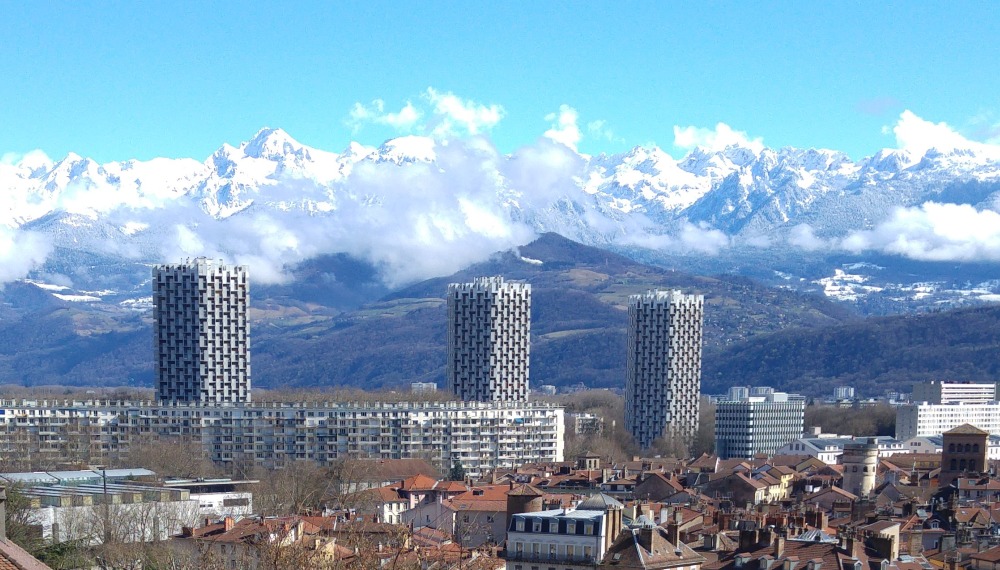
Proceedings are online (available here)
Workshop participants will get a free hard copy and free online access for a limited time.
Location
The 5th International Workshop on 'Hybrid Systems Biology' was held on October 20th and 21st in Grenoble (France) in the new IMAG building.
Organizers
- Eugenio Cinquemani, INRIA, Grenoble, France
- Alexandre Donzé, University of California, Berkeley, USA
- Oded Maler, VERIMAG/CNRS, Grenoble, France
Local Contacts
- Sophie Azzaro, INRIA Grenoble - Rhône-Alpes, (sophie dot azzaro at inria dot fr)
- Catherine Bessiere, INRIA Grenoble - Rhône-Alpes, (catherine dot bessiere at inria dot fr)
Invited speakers
- Guillaume Beslon, INSA-Lyon
- Dennis Bray, University of Cambridge
- Albert Goldbeter, Université Libre de Bruxelles
- Linda Petzold, University of California, Santa Barbara
Objectives
Systems biology aims at providing a system-level understanding of biological systems by unveiling their structure, dynamics, and control methods. Living systems are intrinsically multi-scale in space and in time; they also exhibit a mixture of deterministic and stochastic behaviours. It is therefore very difficult to model them homogeneously, for example by means of systems of differential equations or by purely discrete models. Furthermore, such models are often not easily amenable to formal analysis and even their simulations are frequently impractical. Indeed, an important open problem is finding appropriate computational models that scale-up well for both simulation and formal analysis of biological processes.
Hybrid modelling techniques, combining discrete and continuous components and dynamics, are gaining more and more attention in systems biology. They have been applied to successfully capture the behaviour of several biological complex systems, including genetic regulatory networks, metabolic reactions, signalling pathways as well as higher level models of tissues and organs. As the challenges of scale and intrinsic heterogeneity and inhomogeneity are coming to the forefront of systems biology, the value of the hybrid dynamical modelling paradigm, integrating mathematical models that address distinct spatio-temporal scales and subsystems, becomes evident.
Topics of Interest
HSB is a single-track Systems Biology workshop with emphasis on hybrid approaches in a general sense. Hybrid dynamical modelling but also other dynamical modelling approaches are equally part of the scope of the workshop. Interdisciplinary contributions, such as combining modelling, analysis, algorithmic and experimental techniques from different areas, are especially welcome.
Topics of interest include, but are not limited to:
- Modelling and analysis of metabolic, signalling, and genetic regulatory networks in living cells
- Models of tissues, organs, physiological models
- Cyber-biological systems (e.g. integration of computation, networking and biological processes, medical devices, design and verification of molecular devices, engineered transcription networks)
- Models and methods coping with incomplete, uncertain and heterogeneous information
- Stochastic and hybrid models in biology
- Hierarchical systems for multi-scale, multi-domain analysis
- Abstraction, approximation, discretisation, and model reduction techniques
- Modelling, analysis and design for synthetic biology
- Population models in biology (e.g. Mixed-Effects and Bayesian modelling)
- Parametric and non-parametric learning for biological systems (methods for biological system identification and model selection, online and offline parameter and state estimation methods, inference from experimental data, constrained estimation)
- Biological applications of quantitative and formal analysis techniques (e.g. reachability computation, model checking, abstract interpretation, bifurcation theory, stability and sensitivity analysis)
- Efficient techniques for combined and heterogeneous (stochastic/deterministic, spatial/non-spatial) simulations for biological models
- Modelling languages and logics for biological systems, with related analysis and simulation tools
- Control architectures of biological systems
- Game-theoretical frameworks in biology (e.g., populations dynamics)
- Biology-in-the-loop systems (computer control of living systems, bio-robotics)
- Dynamical modelling for biomedical studies (e.g. therapies, teleoperation)